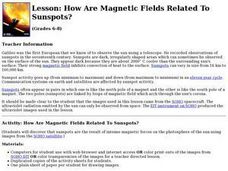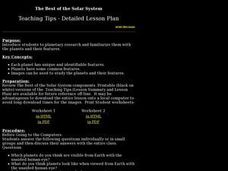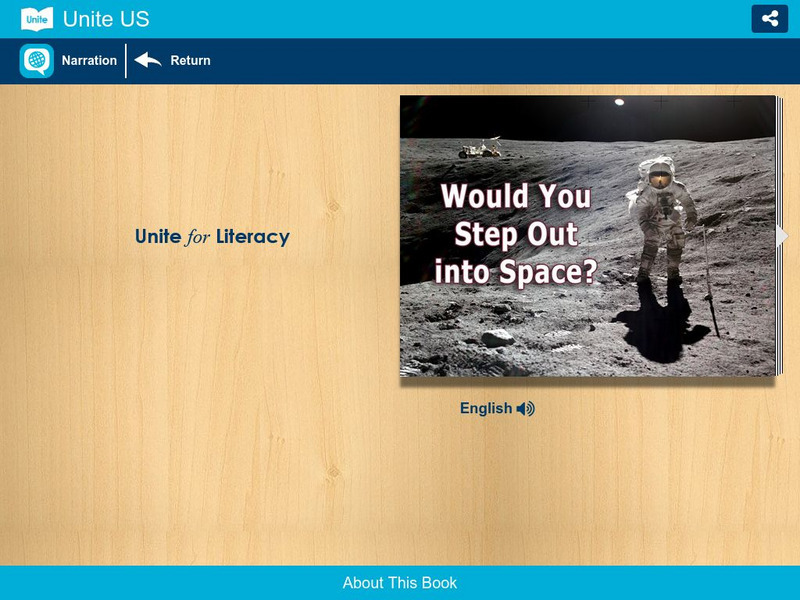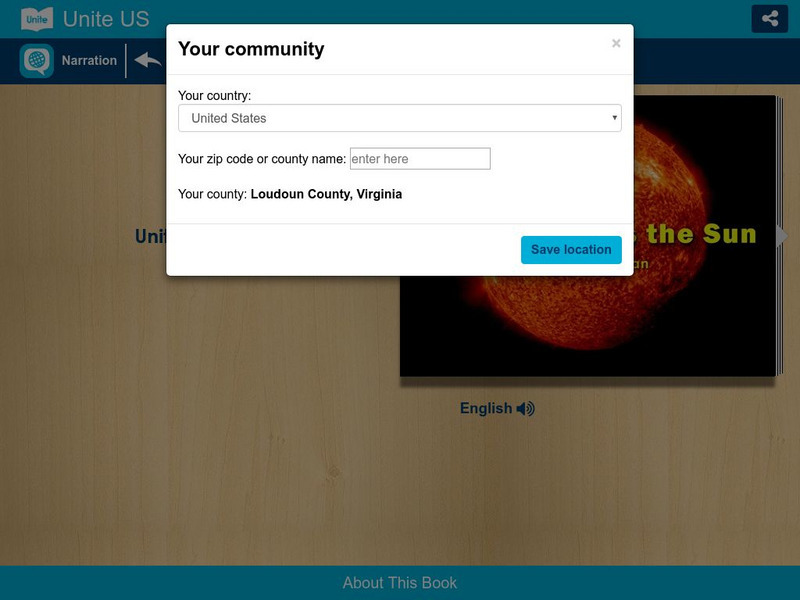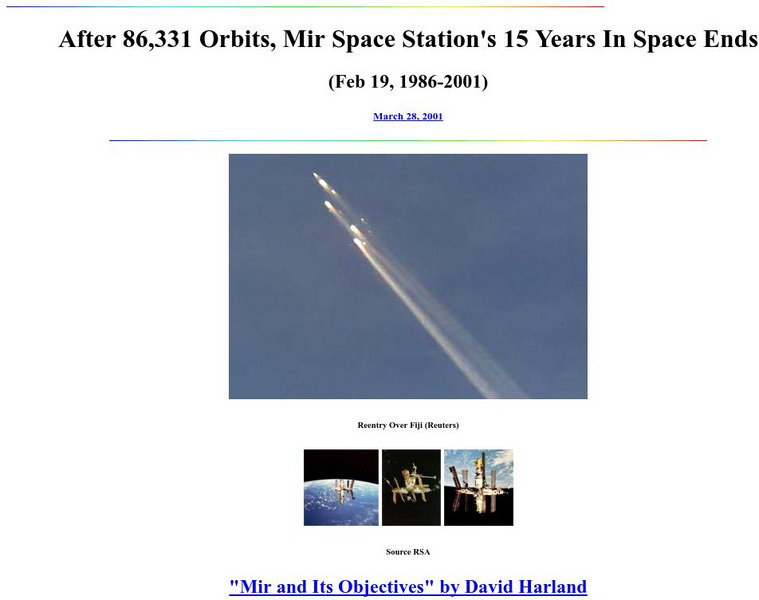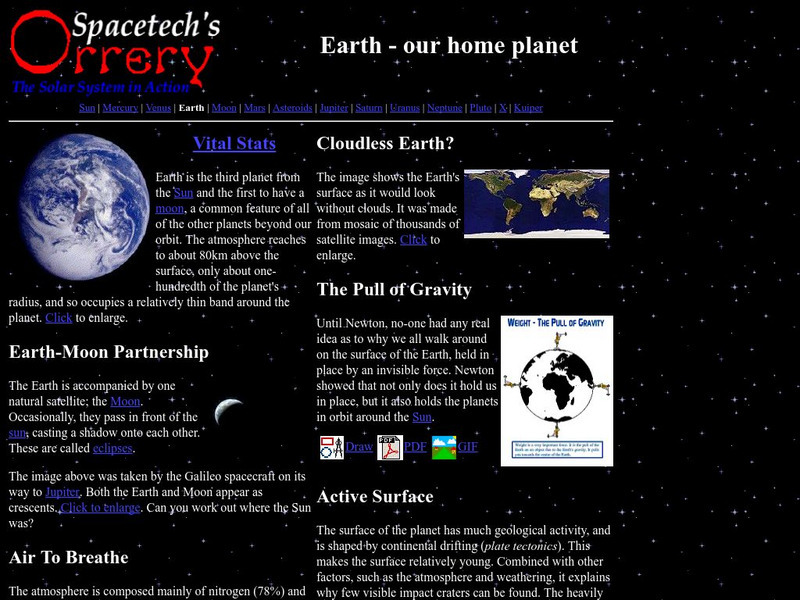Curated OER
Magic Wand
Pupils observe how an image falling on a CCD array is divided into individual pieces, by the property of persistance of vision.
Curated OER
How Are Magnetic Fields Related To Sunspots?
Middle schoolers discover that sunspots are the result of intense magnetic forces on the photosphere of the sun by observing images from the SOHO satellite.
Curated OER
Planetary Research (Grades 9-12)
Students are introduced to planetary research and familiarize them with the planets and their features. They see that each planet has unique features. Planets have some common features and that images can be used to study the planets and...
Curated OER
Best of the Solar System
Students visit a site which provides images to be analyzed. Notes are taken and planets are named based on observed features and observations. Using peer review, they try to determine the identity of the planets. They are free to browse...
Curated OER
Outlining Transportation#139
Students examine how people, products, and ideas travel. They create an outline using the proper format after completing a class brainstorming session about means of transportation.
Curated OER
What Do I See When I Picture Saturn?
Students create their own Saturn Discovery logs. They draw pictures of the planet and its founder. They share their drawings and writings with partners.
Curated OER
Scientific Images & Animations
Students view a variety of scientific images and animations. They explore the world of science and visual art. Students enrich their knowledge through animation examinations of thoughts and feelings and awesome color rainbows of...
Curated OER
The Planet Venus
In this worksheet on the planet Venus, students look at a picture of the planet and read accompanying facts, along with a brief paragraph.
Curated OER
Finding Jupiter's Moons
Students explore Jupiter's Moons. They calculate and predict the location of Jupiter's 4 large moons. In addition, they draw Jupiter with its moons correctly shown for the time of the observation.
Children's Museum
The Children's Museum of Indianapolis: Beyond Spaceship Earth
This unit of study explores the International Space Station through STEM experiences in space science education. Students become a spacecraft crew and launch from Earth to discover how microgravity affects the orbit of the International...
NASA
Nasa Star Child: The Space Shuttle (Level 1)
This site provides a short description of the space shuttle and what it is used for, with diagrams and one quiz question.
TED Talks
Ted: Ted Ed: Will Future Spacecraft Fit in Our Pockets?
When you picture a rocket, you might imagine a giant ship carrying lots of fuel, people and supplies. But what if the next wave of spacecraft were small enough to fit into our pockets? Dhonam Pemba details the future of microspacecraft,...
Wonderville Media
Wonderville: The Space Shuttle
Before the Space Shuttle was invented, NASA, which stands for the National Aeronautics and Space Administration, used rockets to get people to space. The problem with rockets is that they can only be used one time. They wanted a better...
Unite for Literacy
Unite for Literacy: Earth and Sky: Would You Step Out Into Space?
Imagines what it is like to travel to space and what you can see through the window of a spacecraft. Book includes audio narration in 14 additional languages with text in English.
Unite for Literacy
Unite for Literacy: Earth and Sky: Soho Explores the Sun
Read about the work of the spacecraft SOHO and the things we have learned about the Sun from the pictures and information that it sends back to Earth. Book includes audio narration in 6 additional languages with text in English.
Other
Visual Satellite Observer: Mir Space Station's 15 Years in Space Ends
Details of Mir's re-entry into the Earth's atmosphere after 15 years in space. Includes information on Mir's mission, configuration, and history.
Other
The Space Race
Although the space race was originally a competition between two Cold War foes,it ultimately resulted in many benefits for the people of the Earth. Find information on the Mercury, Gemini, and Apollo, and Soviet space programs,...
Kidport
Kidport: The Space Shuttle
Students can see actual photos of a space shuttle launching from earth as well as the people who now could go because of technology. Learn about some of the equipment and vehicles used to make it happen.
NASA
Nasa: Testing a New Spacecraft Material
This is a site from NASA that provides an activity where "You have invented a new material to use for the fuel tanks on the spacecraft. But before you send your new material into the harsh environment of space, you must test it on Earth...
NASA
Nasa Space Science Data Archive: Photo Gallery: Galileo
A well-indexed collection of NASA images taken by the Galileo spacecraft. Images include the spacecraft itself prior to launch and all of the solar system objects this incredible mission has visited.
Other
Spacetech's Orrery: Earth Our Home Planet
This site provides a very interesting overview of our home planet, Earth. Content includes a focus on the atmosphere, the pull of gravity, and the active surface.
NASA
Nasa Space Science Data Archive: Galileo Project Information
This is the homepage of all of the archived information about and from the Galileo Mission. Included is data from the flybys of Venus, Earth, Moon, and Asteroids Gaspra and Ida, as well as the current data from Jupiter and its moons. See...
TeachEngineering
Teach Engineering: Life in Space: The International Space Station
Students are introduced to the International Space Station (ISS) with information about its structure, operation and key experiments. The ISS itself is an experiment in international cooperation to explore the potential for humans to...
NASA
Nasa: Radar Images
See amazing radar images of Earth taken from the space shuttle orbiting high above the surface. Categories include archeology, geology, volcanoes, and more! Visit the NASA/JPL Imaging Radar Program link for more images and information.

